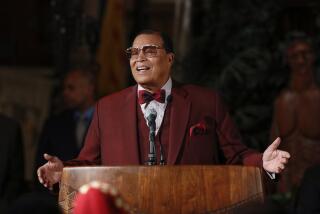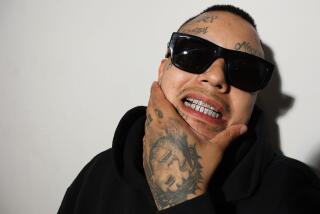Insane Clown Posse sues Justice Department over gang designation
Federal investigators have come down with a case of coulrophobia and now have to explain how the fear of clowns and their fans is not a violation of the U.S. Constitution: The Insane Clown Posse, a hip-hop rap duo, and their fans, known as Juggalos, are suing the U.S. Justice Department for including them in a 2011 FBI report “as a loosely organized hybrid gang.”
The government argued that some Juggalos have been involved in assaults and a small number may have been involved in more serious crimes.
The pair’s supporters disputed that description of the fans.
“The Juggalos are fighting for the basic American right to freely express who they are, to gather and share their appreciation of music, and to discuss issues that are important to them without fear of being unfairly targeted and harassed by police,” said Michael J. Steinberg, legal director of the Michigan chapter of the American Civil Liberties Union, which brought the suit this week in Detroit.
“Branding hundreds of thousands of music fans as gang members based on the acts of a few individuals defies logic and violates our most cherished of constitutional rights,” he said in a prepared statement. Coulrophobia is generally defined as a fear of clowns, though it is more of a cultural phenomenon than a medical condition.
One recent serial killer, John Wayne Gacy Jr., was known a the Killer Clown, for his earlier charitable activities that included performing in clown makeup and costume. But it was really when coulrophobia became a plot device in several television shows, including “The Simpsons,” that the idea became a popular meme.
The rap duo includes Joseph Bruce, or Violent J, and Joseph Utsler, or Shaggy 2 Dope, who perform in clown makeup and have adopted the characters of wicked clowns in their fantasy world of the Dark Carnival. The group, known for its elaborate performances, have earned several platinum and gold albums.
Their fans often paint their faces to look like clowns, and display the “hatchetman” logo and other insignia on their clothing, jewelry, body art and bumper stickers, according to the ACLU. “Juggalos often come together at concerts or their annual week-long summer gathering,” the ACLU said. “They consider themselves a ‘family’ of people who love and help one another and enjoy one another’s company. Juggalos are not an organized fan club, but a group of people who bond over the music and a philosophy of life, much like ‘Deadheads’ bonded around the Grateful Dead.”
The federal government estimates that there were more than a million Juggalos in the United States. The suit was filed on behalf of the performers and four of their fans who claim they were singled out because of their love of the group.
For instance, Brandon Bradley, 20, a self-identified Juggalo, has on numerous occasions been stopped and detained by law enforcement officers in California, said the ACLU. “Each time, the officer has wrongly accused Brandon of being in a gang and has interrogated him about being a Juggalo and his affiliated tattoos and clothing.”
Another plaintiff, Scott Gandy, said he was told that he would not be accepted in the Army because his tattoo was a gang symbol.
ALSO:
Medical marijuana: New York governor proposes pilot program
Tucson honors ex-Rep. Gabrielle Giffords, fellow shooting victims
Two dead, one missing as Navy helicopter crashes off Virginia coast
More to Read
Start your day right
Sign up for Essential California for news, features and recommendations from the L.A. Times and beyond in your inbox six days a week.
You may occasionally receive promotional content from the Los Angeles Times.







